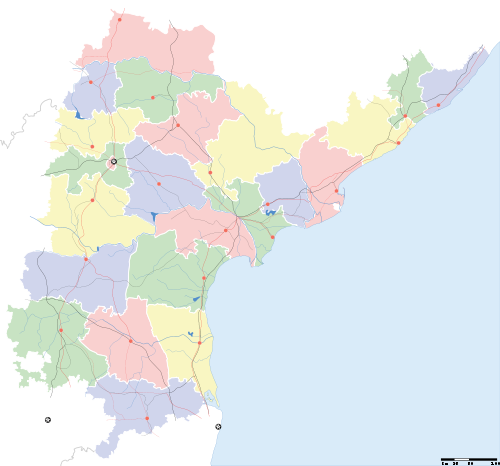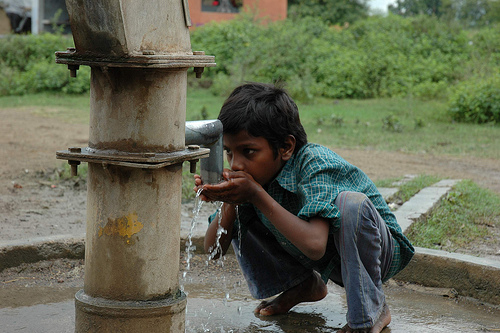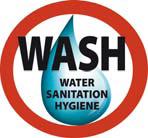/sub-categories/people-and-organisations
People and Organisations
Transparency demanded in a letter to Jairam Ramesh on Polavaram Project - Himanshu Thakkar
Posted on 04 Sep, 2010 10:43 AM![]()
From:
Himanshu Thakkar
South Asia Network on Dams, Rivers & People,
c/o 86-D, AD block, Shalimar Bagh,
Delhi,
To: Shri Jairam Ramesh
Union Minister of State for Env and Forests (IC), New Delhi
Respected Sir,
I have just seen your letter dated Aug 18, 2010 to Orissa Chief Minister on the aboves subject, uploaded yesterday on MEF website.
- Your letter says that the Forest Clearance has been given to the Polavaram Project on July 28, 2010 is subject to the condition, "... no submergence and displacement of people including STs take place in Orissa and Chhattisgarh...". However, this condition is in complete contradiction with the environment clearance given by your ministry on Oct 25, 2005, which says in para 2, "Total 1,93,35 persons are likely to be affected by this project, out of that 1,75,275 persons in Andhra Pradesh and 6,316 persons from Orissa and 11,766 are from Chattisgarh." It is clear the condition of no submergence and displacement on Orissa and Chhattisgarh, stated in your letter, in the Tribal Development Ministry's condition, and in the forest clearance letter is in complete contradiction with the environment clearance given by you. One of them have to be cancelled due to this contradiction, we would like to know, which one would be cancelled.
Groundwater regulation under consideration for Andhra Pradesh
Posted on 16 Aug, 2010 05:01 PMThe legislation is likely to be in the form of an upgrade to the AP Water Land and Trees Act (WALTA).

Click here for the current Act
Attached are two working documents that are being used to frame the discussion for the new regulations.
PLEASE NOTE: These in no way represent final or official positions of the AP Government or other organisations and are not to be taken as such.
Leh cloud-burst: A first-hand account
Posted on 16 Aug, 2010 11:44 AMMidnight, August 6, 2010: "Link, wake up! Water is coming in from the roof!" My mother and I were in Leh, Ladakh, staying at "Eco-Homestay," the house of Mr. Sonam Gyatso and family, in Lower Sankar. The house was made in a hybrid of traditional and modern construction techniques: the main hall in the house was concrete, while rooms surrounding it were made of sun-dried mud bricks, and roofed with Poplar beams, a mesh of willow branches, and a thick pad of fine clay-like mud. The house incorporated passive solar building techniques, such as a direct-gain room, and a Trombe wall, and had solar-powered lighting. It had been raining since evening, and by midnight the clay roof was saturated and began to leak.
We were in Leh for the express purpose of meeting with Helena Norberg-Hodge, the founder of the International Society for Ecology and Culture, co-founder of the International Forum on Globalization, founder of the Ladakh Ecological Development Group, and founder of the Women's Alliance, Ladakh. We had learned of her online, seeing an article of hers in CounterCurrents.org, and watching her video "Ancient Futures." She is the only person who has critically witnessed the "development" of Ladakh, from complete self-sufficiency in an exceedingly fragile eco-system, to the disaster under which it writhes today. She has seen how "development" pulls people into a money economy, increases the distance between production and consumption, brings reliance on fossil fuels (especially apparent in Leh where fuel and commodities are trucked in over a hazardous two-day journey from lower altitudes), results in urbanization and rural-urban migration, and brings psychological impoverishment to the people it is inflicted upon. For 35 years, she has been working to bring safe, stable, and ecologically sound development to the region through her organizations. Her work today, no longer limited to Ladakh, is focussed on spreading economic literacy among people throughout the planet, educating about the deeper impacts of globalization and today's consumer mono-culture. Garnered from her years of observation and research, she has an important message for humanity today, which is what prompted us to go and meet her.
UN General Assembly s resolution on water and sanitation as a human right
Posted on 13 Aug, 2010 05:00 PMThe recent UN General Assembly Resolution on declaring water and sanitation as human right is or can be a powerful impetus to securing universal access to water and sanitation for people everywhere. This is the most recent in a string of initiatives to advance the provision of these essential services. Beginning with the UN Decade of Water in the eighties, then the declaration of the Millennium Development Goals, and later the adoption of General Statement 15 by the Economic and Social Council of the United Nations in 2002 the recognition of the fundamental importance of water (and more recently sanitation) to life, health and well being has been accepted at the international level. In India, while there is no specific mention of the right to water in the Constitution, the Supreme Court in its judgement(s)has upheld this as part of the right to life. Some organizations are working to make this a fundamental right, to remove any ambiguity.

Boy drinking water from handpump in Guna, Madhya Pradesh - Handpumps and wells are still one of the major source of drinking water in India.
Photo credits: Anil Gulati
Power finance: Financial institutions in India's hydropower sector - A report by SANDRP, Urgewald and IRN
Posted on 12 Aug, 2010 05:01 PMThis report published by SANDRP, Urgewald and International Rivers Network (IRN) provides a brief background on India's power and financial sectors and illustrates the issues at stake by giving examples of two important power projects in India, the Dabhol project and the Maheshwar project.
The next part of the report describes the role that the domestic and international financial institutions have played and continue to play and the controversies that have been associated with the functioning of these institutions in the implementation of the hydropower projects in India.
The report emphasises the importance of the role of NGOs and civil society movements in making these institutions accountable to the common people whose lives are affected by the projects/ interventions.
Mountains of concrete: Dam building in the Himalayas - A report by International Rivers Network
Posted on 11 Aug, 2010 07:38 PMThis document by International Rivers Network provides a background for the recent plans initiated by India, Nepal, Pakistan and Bhutan to build several hundred dams on the Himalayan mountains, which store vast amounts of water and with their high slopes and fast moving rivers, present a huge potential for generating hydropower.
India, Nepal, Pakistan and Bhutan have been facing the increasing challenges of meeting their rising elecricity and energy needs and hydropower dams in the Himalayas are being proposed as solutions to meet a considerable part of these requirements.
The document examines the various arguments that have been put forward against the building of the dams as against the proposed advantages that the dams are claimed to have for these four countries, which share common geographical, topographical and eco-climatic features but have starkly different political and economic contexts.
Second press release from Water Initiatives Orissa on the myth of Surplus Water in Orissa
Posted on 11 Aug, 2010 01:46 PM
- WIO demands the Government of Orissa to come out with a White Paper on water first and then decide on new allocations.
- No new industries should be allowed to draw water unless this White Paper prepared and made public.
- That Orissa is a ‘Surplus Water’ state is a ‘myth’.
National Hydroelectric Power Corporation: People don't matter - A dossier by Urgewald
Posted on 11 Aug, 2010 01:24 PMThis document by Urgewald provides a brief overview on the role of India's premier dam building agency, the National Hydroelectric Power Corporation (NHPC) in the construction of dams in India and is highly critical of the mode in which the NHPC has been aggressively expanding its operations of building dams across rivers in the country.
It aims to inform the public, investors and financiers about NHPC’s track record and expansion plans and presents compiled information from three regions where NHPC has been actively involved in the construction of dams namely:
- Narmada Valley in Central India
- Sikkim and Arunachal Pradesh in Northeastern India
- The lands of the Kuki people in Northwestern Burma, where NHPC is building a dam for the military junta.
India WASH forum e-newsletter - Update 13 July 2010
Posted on 02 Aug, 2010 11:56 AMWe see this newsletter as a platform for independent credible voice in the water and sanitation sector. Our emphasis is on bringing together critical news and information with analysis. In this issue we share news and analysis on topical issues and developments.
The Department of Drinking Water and Sanitation(DDWS) has simultaneously invited inputs to Discussion Papers on Drinking Water and Sanitation, circulated on Solution Exchange. Inputs given by India WASH Forum, on this, is enclosed in this Update. We have pointed out the missing elements of sanitation improvement strategy that include, criticality of providing water as an inseparable component to household sanitation, the tendency to see behavior change as a lifestyle issue and not linked to the hardware components, peoples livelihoods and living conditions. Suggestions for what needs to be done to strengthen the implementation mechanism of the flagship sanitation programme(TSC) and partnerships.
Analysis of surface and groundwater flow process in Western Ghat of Dakshina Kannada district of Karnataka – A research report by National Institute of Hydrology
Posted on 29 Jul, 2010 09:04 PMThe study deals with the analysis of surface and groundwater flow process in Dakshina Kannada district in Western Ghats of Karnataka. The area receives over 4000 mm rainfall annually but is still faced with acute shortage of freshwater during summer months. The study attempts to identify the surface and sub-surface flow process through geohydrological and geomorphological investigations in the Sithanadhi and Netravathi basins.
